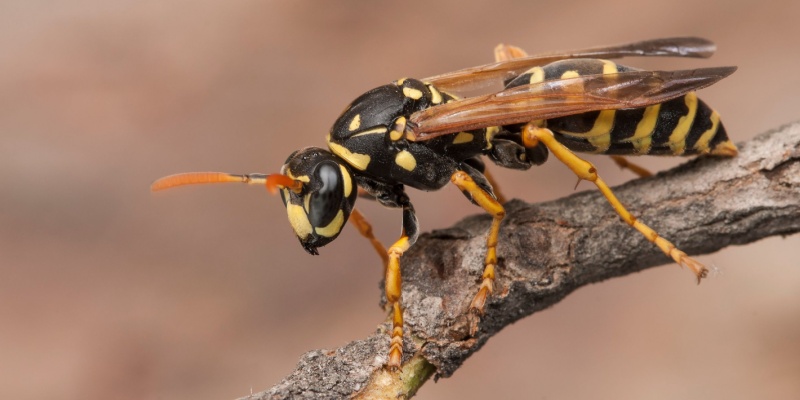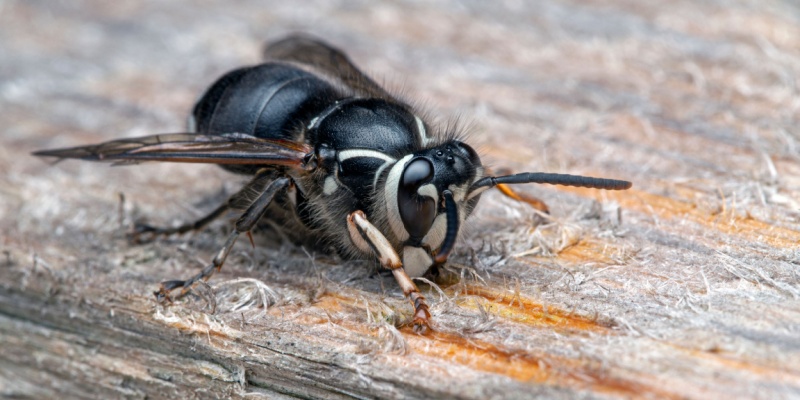Indianapolis, with its diverse ecosystems and lush greenery, is home to a variety of stinging insects. While many of these insects play important roles in pollination and pest control, their presence can sometimes pose risks to humans, especially when they nest close to homes or areas of frequent human activity. Understanding the types of stinging insects common in Indianapolis can help you identify potential threats and take appropriate measures to protect yourself and your property. Here’s a detailed look at the most common stinging insects in the area:
1. Honeybees
- Appearance: Honeybees are small, about 0.5 inches long, with golden-yellow bodies and brown bands.
- Behavior: Known for their vital role in pollination, honeybees are generally non-aggressive unless their hive is threatened. They live in large colonies and produce honey and beeswax.
- Nesting Sites: Honeybees build their nests in hollow trees, walls, or attics. Their hives consist of waxy, hexagonal cells.
- Risks: While honeybee stings are generally mild, they can cause severe allergic reactions in some individuals. It’s important to handle infestations carefully to avoid unnecessary harm to these beneficial insects.
2. Bumblebees
- Appearance: Bumblebees are larger than honeybees, with fuzzy bodies covered in black and yellow hairs. They are about 0.6 to 1 inch long.
- Behavior: Bumblebees are also important pollinators and are usually docile. However, they can sting multiple times if their nest is disturbed.
- Nesting Sites: They often nest in the ground, in abandoned rodent burrows, or under piles of leaves and grass.
- Risks: Bumblebee stings can be painful and cause allergic reactions. They are less likely to sting than some other stinging insects but will defend their nests aggressively.
3. Carpenter Bees
- Appearance: Carpenter bees resemble bumblebees but have shiny, hairless abdomens. They are about 0.5 to 1 inch long.
- Behavior: These bees are solitary and do not form large colonies. They bore into wood to create nests, which can cause structural damage over time.
- Nesting Sites: Carpenter bees prefer untreated or weathered wood, including eaves, decks, and wooden furniture.
- Risks: While male carpenter bees cannot sting, females can deliver a painful sting if provoked. The primary concern with carpenter bees is the damage they cause to wooden structures.
4. Paper Wasps
- Appearance: Paper wasps are slender with long legs, measuring about 0.75 to 1 inch long. They have black or brown bodies with yellow or red markings.
- Behavior: These wasps are generally non-aggressive but will sting if their nest is threatened. They feed on caterpillars and other soft-bodied insects, which makes them beneficial for pest control.
- Nesting Sites: They build open, umbrella-shaped nests from paper-like material under eaves, in attics, or other sheltered areas.
- Risks: Paper wasp stings can be painful and cause allergic reactions. Their nests can sometimes be found in high-traffic areas, posing a risk of stings.
5. Yellowjackets
- Appearance: Yellowjackets are small, about 0.5 inches long, with yellow and black-striped bodies.
- Behavior: Yellowjackets are highly aggressive and can sting multiple times. They are scavengers, often found around garbage or sugary foods.
- Nesting Sites: They build nests in the ground, in wall voids, or in trees and shrubs. Their nests can house thousands of individuals.
- Risks: Yellowjacket stings are extremely painful and can cause severe allergic reactions. Their aggressive nature makes them a significant threat, especially in late summer and fall, when they become more defensive.
6. Hornets
- Appearance: Hornets are larger than yellowjackets, about 1 to 1.5 inches long, with black and white or brown and yellow markings.
- Behavior: Hornets are very aggressive and can sting multiple times. They prey on other insects and can be beneficial for pest control but are dangerous when their nest is nearby.
- Nesting Sites: They build large, spherical nests in trees, bushes, or under eaves.
- Risks: Hornet stings are painful and can cause severe allergic reactions. Their nests can grow very large and pose a significant threat if disturbed.
7. Bald-Faced Hornets
- Appearance: A type of hornet, bald-faced hornets are black with white markings on their face and body, about 0.75 to 1 inch long.
- Behavior: These hornets are highly aggressive and will defend their nest vigorously. They are also beneficial for controlling other pest and insect populations.
- Nesting Sites: They build paper-like nests that can be as large as a basketball and are typically found in trees, shrubs, or on buildings.
- Risks: Bald-faced hornet stings are extremely painful and can cause allergic reactions. Their aggressive nature and large nests make them particularly dangerous.
Preventive Measures
To protect your Indianapolis home from stinging insects, consider the following preventive measures:
- Regular Inspections: Check your property regularly for nests and take action early to prevent infestations from growing.
- Seal Entry Points: Seal cracks and gaps in walls, windows, and doors to prevent insects from entering your home.
- Proper Waste Management: Keep garbage cans sealed and clean up food and drink spills promptly to avoid attracting stinging insects.
- Yard Maintenance: Keep your yard tidy, trim trees and bushes, and remove debris where insects might nest.
Why Choose Trio Pest Control?
When dealing with stinging insects, professional pest control services offer several advantages:
- Expertise and Safety: Our team at Trio Pest Control has the experience and knowledge to handle stinging insects safely and effectively.
- Comprehensive Solutions: We provide thorough inspections, identify the type of stinging insects, and implement customized treatment plans.
- Eco-Friendly Practices: Whenever possible, we use eco-friendly and humane methods to manage stinging insect populations.
- Customer Satisfaction: Our commitment to customer satisfaction means we strive to deliver the best service and ensure your home is safe from stinging insects.
Understanding the common stinging insects in Indianapolis and taking preventive measures can help protect your home and family. While some DIY methods can be effective for minor issues, professional pest control services like Trio Pest Control are essential for managing larger or more aggressive infestations. With our expertise, comprehensive solutions, and commitment to safety, you can trust us to keep your home free from the dangers of stinging insects. Contact Trio Pest Control today for all your pest management needs.

